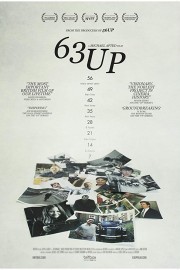63 Up
**You can see my review of the series, up to “49 Up,” here.
Once you watch your first film in the “Up” series, you will be hooked for the rest of your life. I first watched the films in Michael Apted’s series in 2006, with the release of “49 Up” pending. The catch is, once you’re caught up, it becomes a waiting game, waiting for Apted, who was only an assistant on “7 Up” before he took over the directing reins, to bring out the next film.
We are now at “63 Up,” and over the years, Apted has had to figure out how to streamline his narratives showing us the ways these individual’s lives have grown and changed from age 7 to now. Not everyone who started in that first documentary is involved anymore, but at this point, everyone who has been involved with it for the last couple of films are basically here to stay, and those whom haven’t been will not be. It is informational overload if you’re catching up with this series in quick succession; since the last film was in 2013, it’s been six years since I’ve seen “56 Up,” so I’m having to wait like everyone else. Like any “franchise,” it’s like reuniting with old friends when the new chapter comes.
With “63 Up,” we are at the point where life and death becomes an important part of these interviews, and indeed, Nick reveals that he is struggling with cancer, and treatments have thinned his blood. If we get to “70 Up,” will we hear he has passed in the meantime? Will we see him in the end? That’s a question Roger Ebert, whose championing of the series is how myself- and many others- have gotten into the films, posed to Apted several years ago; it’s a fascinating question, and one without an easy answer, if we’re being honest with ourselves. What if Apted goes first? What filmmaker would be capable of taking over this project? Hopefully, we won’t have to think about those questions in the next seven years.
These films are as much about the families these individuals have built over the years, at this point, as they are the men and women whom we began following at seven. It still comes down to Tony and Sue and Andrew and Nick and Bruce and Jackie and Peter and Lynn (who did pass away in between films; it’s interesting and beautiful to see how Apted handles it) and Paul and Symon and John and Suzanne (who chose not to participate this film) and Neil and Charles (whom does not participate). We get the words of family and loves ones throughout the film, but in the end, it’s about the people we’ve followed since they were seven, how their lives have transformed, and how they have stayed the same.
This film is almost as much about this series’s own legacy, and the legacies these people are wanting to leave not just for their families, but the world in general. Questions about Trump and Brexit and the decline of social services and the increase in inclusion over the years are asked by Apted, and the answers reflect the anxiety a lot of people feel right now about such divisive subjects; we even see how modern society has challenged them in their livelihood- Tony, the taxi driver whom has been the first subject for the last few films, lays out the difficulties that Uber and Lyft have made for him in his career. We also hear him ask his subjects the question the first film was inspired by, “Give me a child at 7, and I will show you the man.” Do his subjects think that’s true? Do we think that’s true? Is there anything about these people that could have been predicted then? Apted sometimes learned the hard way not to do that. His subjects did, at times, as well.
It’s inevitable, in watching Apted’s series, that our minds will turn from the lives on the screen to our own lives, in considering the impact these films have on us. I am 42 years old right now, exactly 21 years younger than this film’s subjects, and I start to look at my life in seven year chunks, like these films do. At 21 I was in college, hungry to write film music, and just learning about sound recording and MIDI, both things I thought would lead me to that path. At 28, I was working at the movie theatre, and just getting my sea legs back in terms of composing, and this website had been online for a year. At 35, I was still working at the theatre, still composing, still writing reviews, and, though I didn’t realize it, getting ready to embark on the first real romantic relationship after the interim time saw me almost die from asthma and pneumonia, and having to face the anxiety and stress-related issues that haunted me for ages. Now, at 42, I am four years into marriage with the woman I started dating, and we have built a life together. My father has died, and my mother’s health is not great. I have put aside my desire to write film music, and devote my time entirely to writing reviews and discussing cinema when I am not at the movie theatre. At age 7, I don’t know that anyone could have predicted that, let alone me. I’m a lot like Neil in this series, whom was also a late bloomer in life. His story is the one that ends “63 Up,” and seeing him so confident, so certain of himself given where he was at at 35, it’s one of the most inspiring stories the documentary form has ever produced. That’s fitting, given how inspiring this series remains to those of us whom, once we latched on to it, have never let go.










